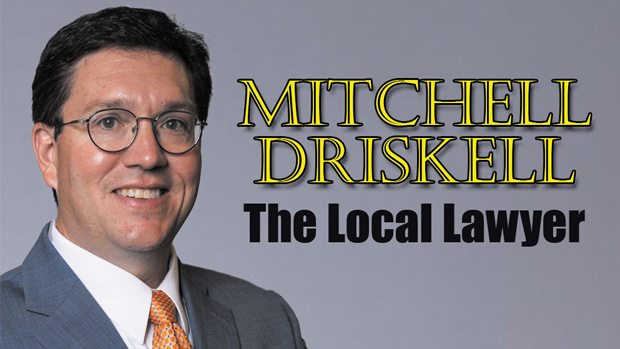
War of the Words
There is a case pending before the Supreme Court that is a good example of how lawsuits that last years and years, even make it to the Supreme Court, can turn on a few words.
The subject of the case is bankruptcy. When a person files bankruptcy, all creditors must immediately stop trying to get their money – no phone calls, no emails, no letters, and any pending collection lawsuits are paused. This is called the “Automatic Stay” and is one of the protections offered to debtors who file bankruptcy – you no longer are hounded about your unpaid bills.
The Automatic Stay applies to governmental entities, too. The City electric department, the City trash department, etc. cannot hound you for payment. Specifically, the statute says it applies to the Federal government, the States and “other domestic or foreign governments.” That seems to apply to all governments, simple enough?
Well, Brian Coughlin borrowed $1,100 from a payday loan business owned by the Lac Du Flambeau Band of Lake Superior Chippewa Indians. Coughlin filed bankruptcy and “The Band,” as they call themselves, did not stop trying to collect and now argues before the Supreme Court that the Automatic Stay does not apply to Native American Nations.
Coughlin says “other domestic or foreign governments” is simple to read and apply – The Band is a domestic or foreign government, end of story. The Band argues that “other domestic or foreign governments” does not include Native American Nations because in every other law where the federal government says that United States law controls over Native American sovereign freedom then that law specifically says Native American Nations are included. And they are right, there is no known law that imposes control over the freedom of Native American Nations without specifically saying so.
Since the bankruptcy law does not say Native American governments, the tribe argues, Congress did not intend to include them – because they are always specific when it comes to telling Native American Nations what to do. I bet you did not think you would hear a good argument why the words “other domestic or foreign governments” does not include Native American governments.
For three years Coughlin and The Band have been arguing these three words, which happens all the time.
It isn’t the Crime, It’s the Cover-up
Trump is indicted again. This time it is about classified documents, and, the kickers, obstruction of justice and false statements. For Trump supporters, the obstruction and false statement charges should draw concern. While the special counsel and media may bloviate about how serious the classified document charges are, no one is listening, partially because Joe Biden got caught with his own stash of classified documents, and the American public is pretty big on the law of the goose and the gander.
Also named in the indictment is Walt Nauta, a former presidential aide who kept working for Trump after Trump left office. Nauta faces six charges. Trump and Nauta, along with others, are charged with conspiracy to obstruct justice for allegedly conspiring to keep documents from the grand jury. They are also charged with withholding a document or record, corruptly concealing a document or record, concealing a document in a federal investigation, scheme to conceal, and two counts of false statements and representations.
It seems pretty clear what the Feds are alleging – Trump was caught red-handed with the classified documents but lied to cover it up, which is a common fact pattern in politics – it isn’t the scandal that gets you, it is the cover up that gets you. See Watergate, Clinton/Lewinski.
The FBI and US Attorneys are pros at prosecuting obstruction-type charges, and anyone supporting Trump needs to be concerned about these charges being a centerpiece of the recent indictment.
I’m a Barbie Girl, Living in a Legal World
Justice Elena Kagan sang “I’m a Barbie girl, Living in a Barbie world” from the bench of the United States Supreme Court. No cap. She’s talking about trademark law.
The Court, in a unanimous decision last week, sided with Jack Daniel’s Tennessee Whiskey in its legal fight with VIP Products, a dog toy maker whose “Bad Spaniels” squeaky toy looks like almost exactly like a Jack Daniels bottle.
Justice Elena Kagan had a good time announcing the decision, holding up the Bad Spaniels novelty dog toy, then singing the words “I’m a blond bimbo girl, in a fantasy world.” In the non-entertaining world of trademark law, the Court explained, the defining characteristic of a trademark is that it signals the “source” of a good or service to consumers.
For example, when you see the word “Oreo” on a package of cookies, you know those cookies came from the same company as every other pack of Oreo cookies. That makes “Oreo” a trademark.
The Court held that using someone else’s trademark, or a modified version of it like the “Bad Spaniels” mark that looked just like Jack Daniels, violates trademark law. Bad Spaniels had argued that the First Amendment protected poking fun at Jack Daniels as a parody. The Court said parodies are fine as long as it is clear that the parody is not coming from the original owner of the trademark, for example, “I’m Fat” by Weird Al and “Barbie World” by Aqua.
Mitchell Driskell practices law with the Tannehill Carmean firm and has been an Oxford lawyer for twenty two years. You can call him at 662.236.9996 and email him at mitchell@tannehillcarmean.com. He practices criminal law, civil law and family law.


